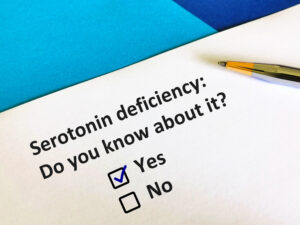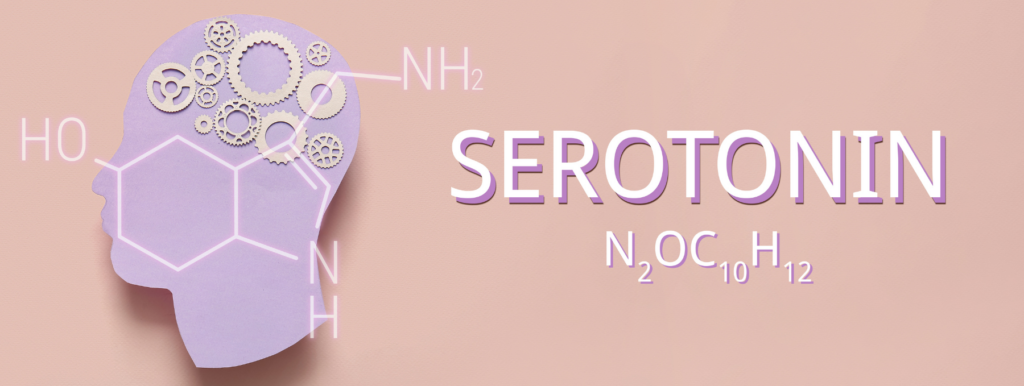Serotonin is often referred to as the “feel-good” neurotransmitter due to its crucial role in regulating mood, emotions and certain bodily functions. Found primarily in the brain, intestines and blood platelets, serotonin influences not only emotional well-being but also physical health. However, when serotonin levels drop, it can lead to a condition known as serotonin deficiency, or serotonin deficit, which can have profound effects on both psychological and physical health.
A serotonin deficiency can manifest in many ways, and can lead to significant issues such as depression, anxiety, sleep disturbances and even digestive problems. The ripple effects of low serotonin levels can impact daily functioning, relationships and overall quality of life. Understanding the intricacies of serotonin deficiency is essential in order to recognize its symptoms and seek appropriate treatment. By answering the question, “What is serotonin deficiency,” those affected by this condition can take proactive steps toward improving their mental and physical well-being.
What is Serotonin Deficiency?
 Serotonin is a neurotransmitter, a chemical messenger that transmits signals in the brain. Serotonin is found primarily in the brain, intestines and blood platelets, where it plays a crucial role in numerous bodily functions. One of its key roles is mood regulation; serotonin helps maintain a balanced mood and emotional state, promoting feelings of happiness and well-being.
Serotonin is a neurotransmitter, a chemical messenger that transmits signals in the brain. Serotonin is found primarily in the brain, intestines and blood platelets, where it plays a crucial role in numerous bodily functions. One of its key roles is mood regulation; serotonin helps maintain a balanced mood and emotional state, promoting feelings of happiness and well-being.
Additionally, serotonin is a precursor to melatonin, the hormone that regulates the body’s sleep-wake cycles, making adequate levels essential for restful sleep. Serotonin also influences appetite by signaling hunger and satiety, helping to control food intake. Furthermore, serotonin plays a significant role in cognition, and can impact learning, memory and decision-making processes. Serotonin levels also affect social behavior, influencing how we interact with others and form relationships.
What is serotonin deficiency? Serotonin deficiency occurs when there is an insufficient level of serotonin in the brain and body. This deficiency can lead to a range of psychological and physical symptoms and can significantly impact quality of life. When serotonin levels are low, people may experience mood disorders, sleep issues, appetite changes, cognitive impairments and social withdrawal, all of which can hinder daily functioning and overall quality of life.
The Symptoms of Serotonin Deficiency
The symptoms of serotonin deficiency can vary widely, but there are several common symptoms that may be experienced. One of the most prevalent symptoms of serotonin deficiency is depression, characterized by persistent feelings of sadness, hopelessness or a lack of interest in activities that were once enjoyable. Alongside depression, those with serotonin deficiency may also experience anxiety, which can manifest as increased feelings of worry, nervousness or even panic attacks.
Sleep disturbances are another common symptom of insufficient serotonin levels. These may include insomnia, disrupted sleep patterns or excessive sleepiness during the day. Many of those with serotonin deficiency report fatigue, and experience chronic tiredness or a lack of energy even after getting adequate rest. Changes in appetite may also occur, with some people experiencing increased hunger while others noticing a decrease in appetite that leads to noticeable weight changes.
Serotonin deficiency can also cause mood swings; rapid changes in emotional state that are often accompanied by feelings of irritability or anger. Cognitive issues, such as difficulty concentrating, making decisions or remembering things, can further complicate daily life for those experiencing serotonin deficiency. Physical symptoms may also arise, including headaches, digestive issues or chronic pain, all of which can contribute to a diminished quality of life.
What Causes Serotonin Deficiency?
Several factors can contribute to serotonin deficiency, each of which plays a unique role in the regulation of serotonin levels in the body. One significant factor is genetics; those with a family history of mood disorders, such as depression or anxiety, may be more susceptible to serotonin deficiency due to inherited traits that affect neurotransmitter function.
Another critical factor that affects serotonin levels is diet. A diet lacking in essential nutrients can hinder serotonin production. Key nutrients that support serotonin synthesis include tryptophan, an amino acid found in foods like turkey, chicken, eggs, dairy products, nuts and seeds. Additionally, omega-3 fatty acids, which are found in fatty fish, flaxseeds and walnuts, are crucial for brain health. Vitamins B6 and B12 are also essential for neurotransmitter synthesis and can be obtained from sources such as meat, fish, eggs and fortified cereals.
 Chronic stress is another major contributor to serotonin deficiency. Prolonged exposure to stress can deplete serotonin levels, as the body’s stress response can lead to hormonal imbalances that negatively affect serotonin production. Ongoing stress can also alter brain chemistry, making it more challenging to maintain balanced serotonin levels.
Chronic stress is another major contributor to serotonin deficiency. Prolonged exposure to stress can deplete serotonin levels, as the body’s stress response can lead to hormonal imbalances that negatively affect serotonin production. Ongoing stress can also alter brain chemistry, making it more challenging to maintain balanced serotonin levels.
Certain medical conditions can also impact serotonin levels. For instance, chronic pain conditions like fibromyalgia or arthritis can lead to changes in serotonin production. Hormonal imbalances, such as those associated with thyroid disorders or menopause, can also affect serotonin levels. Additionally, gastrointestinal disorders, including irritable bowel syndrome (IBS), can influence serotonin levels since a significant amount of serotonin is produced in the gut.
Substance use, including the abuse of alcohol and recreational drugs, can also interfere with serotonin production and function. Chronic use of these substances can lead to long-term changes in brain chemistry, which can exacerbate serotonin deficiency and complicate recovery efforts.
Serotonin Deficiency: The Risk Factors
Understanding the risk factors associated with serotonin deficiency is crucial for identifying those who may be more susceptible to this condition. One significant risk factor is a family history of mood disorders. This is because a genetic predisposition can increase the likelihood of developing serotonin deficiency. Additionally, due to the effect of chronic stress on serotonin levels, individuals experiencing ongoing stress from work, relationships or financial issues may find themselves at a higher risk.
A poor diet can also contribute to serotonin deficiency, particularly if it lacks essential nutrients necessary for serotonin production. A sedentary lifestyle can also negatively impact serotonin levels, as regular physical activity is known to boost serotonin synthesis. Individuals with certain medical conditions, such as chronic pain, hormonal imbalances or gastrointestinal disorders, may also be more susceptible to serotonin deficiency due to the interplay between these conditions and serotonin production. Substance abuse, particularly the abuse of alcohol or drugs, has also been shown to significantly increase the risk of developing serotonin deficiency, as these substances can disrupt normal neurotransmitter function and lead to imbalances in brain chemistry.
How Serotonin Deficiency Impacts Lifestyle
Serotonin deficiency can have a profound impact on various aspects of life. Understanding these effects is crucial in order to recognize the importance of addressing this condition and its implications for overall well-being.
Serotonin and Mental Health
One of the most significant impacts of serotonin deficiency is on mental health. Those suffering from serotonin deficiency may experience an increased risk of depression, and chronic low serotonin levels are closely linked to major depressive disorder. This relationship can create a cycle where depression exacerbates serotonin deficiency, making recovery more challenging. Additionally, many people with serotonin deficiency also experience anxiety disorders, including generalized anxiety disorder (GAD) and panic disorder. The interplay between anxiety and serotonin levels can create a feedback loop, worsening both conditions. Cognitive impairments, such as difficulty concentrating, memory issues and challenges in decision-making, can further hinder daily functioning, which can affect work performance and personal relationships.
 How Serotonin Affects Physical Health
How Serotonin Affects Physical Health
The impact of serotonin deficiency extends beyond mental health. Serotonin plays a crucial role in various bodily functions, and its deficiency can lead to several physical health issues. For instance, since serotonin is a precursor to melatonin, low serotonin levels can disrupt sleep patterns, resulting in sleep disorders such as insomnia or excessive daytime sleepiness. Poor sleep can further exacerbate mental health issues, creating a vicious cycle. Additionally, a significant amount of serotonin is produced in the gut, and its deficiency can lead to gastrointestinal problems such as irritable bowel syndrome (IBS), bloating and constipation. Those with serotonin deficiency may also experience heightened sensitivity to pain, making chronic pain conditions more challenging to manage.
The Effects of Serotonin Deficiency on Social Life
Serotonin deficiency can also significantly impact social relationships. Those with serotonin deficiency may withdraw from social activities due to feelings of sadness, anxiety or irritability. This can lead to isolation and loneliness, which can further exacerbate mental health issues. Communication difficulties may arise as mood swings and cognitive impairments may hinder effective interaction, resulting in misunderstandings and conflicts in relationships.
Ultimately, the combination of mental, physical, and social challenges associated with serotonin deficiency can significantly reduce a person’s overall quality of life, making it difficult to engage in enjoyable activities or maintain fulfilling relationships.
Treatment Options for Serotonin Deficiency
Understanding “what is serotonin deficiency” and recognizing its symptoms is the first step toward recovery. If you or someone you know is experiencing persistent sadness, anxiety or cognitive difficulties, it’s essential to seek professional help to determine whether serotonin deficiency might be a factor.
Addressing serotonin deficiency typically involves a multifaceted approach, including lifestyle changes, therapy and medication. Some common treatment options are outlined below.
1. Medications
- Antidepressants: Selective serotonin reuptake inhibitors (SSRIs) are commonly prescribed to increase serotonin levels in the brain. Examples include fluoxetine (Prozac), sertraline (Zoloft), and escitalopram (Lexapro). These medications can help alleviate symptoms of depression and anxiety.
- Other Medications: In some cases, other types of antidepressants or medications may be prescribed, depending on individual needs and responses to treatment. This can include monoamine oxidase inhibitors (MAOIs), which work by preventing the breakdown of serotonin in the brain, thereby increasing its availability. MAOIs can be effective for some people, particularly those who have not responded well to other treatments.
2. Therapy
- Cognitive-Behavioral Therapy (CBT): This form of therapy focuses on identifying and changing negative thought patterns and behaviors. CBT has been shown to be effective in treating depression and anxiety, helping people to develop coping strategies and improve their mood.
- Mindfulness and Relaxation Techniques: Practices such as mindfulness meditation, yoga and deep breathing exercises can help reduce stress and improve overall well-being.
3. Lifestyle Changes
 Diet: A balanced diet rich in nutrients that support serotonin production is essential. Incorporating foods high in tryptophan, omega-3 fatty acids and vitamins B6 and B12 can help improve serotonin levels. Foods to consider include turkey, chicken, eggs, dairy products, nuts, seeds, fatty fish and leafy greens.
Diet: A balanced diet rich in nutrients that support serotonin production is essential. Incorporating foods high in tryptophan, omega-3 fatty acids and vitamins B6 and B12 can help improve serotonin levels. Foods to consider include turkey, chicken, eggs, dairy products, nuts, seeds, fatty fish and leafy greens.- Exercise: Regular physical activity has been shown to boost serotonin levels and improve mood. Aim for at least 30 minutes of moderate exercise most days of the week.
- Sleep Hygiene: Establishing a regular sleep schedule and creating a restful sleep environment can help improve sleep quality, which is crucial for maintaining healthy serotonin levels.
- Stress Management: Engaging in stress-reducing activities, such as hobbies, spending time with loved ones or practicing relaxation techniques, can help mitigate the effects of chronic stress on serotonin levels.
4. Supplements
Some people with serotonin deficiency may benefit from supplements that support serotonin production, however, it’s essential to consult a healthcare provider before starting any new supplement regimen. Potential supplements include:
- 5-Hydroxytryptophan (5-HTP): This supplement serves as a direct precursor to serotonin and may help increase its levels in the brain.
- Tryptophan: As a precursor to serotonin, tryptophan supplements may help increase serotonin levels, but they should be taken under medical supervision.
- Omega-3 Fatty Acids: Found in fish oil, these can support brain health and improve mood.
- Vitamin D: Low levels of vitamin D have been linked to depression, and supplementation may help improve mood.
In addition to professional help, building a strong support system is vital. Friends, family and support groups can provide emotional support and encouragement throughout the recovery process. Sharing experiences and feelings with others who understand can alleviate feelings of isolation and foster a sense of community.
Embracing Recovery from Serotonin Deficiency
Serotonin deficiency can significantly affect mental health, physical well-being and social relationships. Understanding what is serotonin deficiency, its causes, symptoms and treatment options is vital for those affected by this condition. Seeking professional help, making lifestyle changes and building a supportive network can help manage this condition and improve quality of life.
If you suspect serotonin deficiency in yourself or someone else, reaching out for help is essential. Recovery is achievable with the right support and strategies, allowing sufferers to regain control over their mental health and lead fulfilling lives. While the journey may be complex, it offers opportunities for growth and healing. By prioritizing mental well-being, those affected by serotonin deficiency can cultivate resilience and find joy in daily life.




